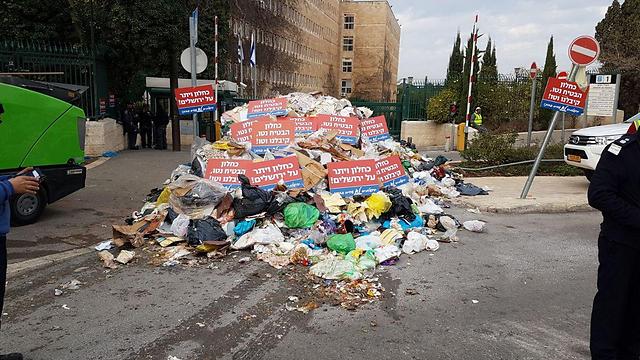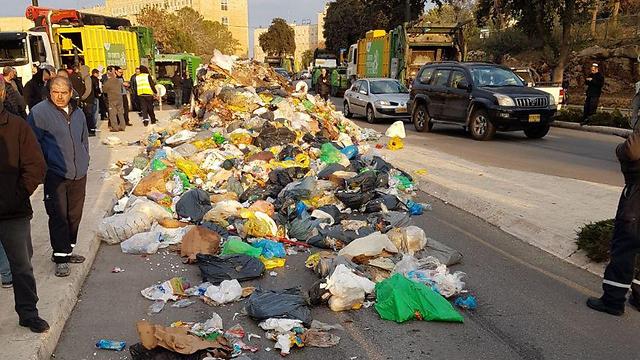

Barkat, Kahlon butt heads over 'capital grant'
Jerusalem Mayor Barkat goes on warpath against Finance Minister Kahlon for 3rd consecutive year, demanding transfer of promised NIS 105 million due to Jerusalem's special status, poor yet enormous populace; municipality employees block entrance to Jerusalem Finance Ministry offices with garbage, municipality petitions HCJ to coerce fulfillment of commitment.
Employees of the Jerusalem municipality blocked the entrance of the Finance Ministry's offices in the capital Sunday morning by piling garbage near the doors, in a protest constituting one facet in the ongoing quarrel between Jerusalem Mayor Nir Barkat and Finance Minister Moshe Kahlon over increased budgets for the capital.
Outside the Finance Ministry's offices, municipality employees stacked piles of garbage alongside signs saying "Kahlon gave up on Jerusalem." Barkat paid for the signs out of pocket, but they nevertheless carried the municipality's seal. In response, the Finance Ministry sent letters of complaint to the police's Jerusalem District chief and the Minister of Environmental Protection Ze'ev Elkin.

Simultaneous to the symbolic protest, the municipality also petitioned the High Court of Justice to intercede and force the ministry to uphold its commitments.
The municipality said the petition was submitted due to the fact the ministry was blocking the transfer of NIS 105 million it was obligated to supply with the municipality with as part of the agreement to solve a spat over budgeting the city in 2017.
Sunday's events marked the third consecutive year Barkat and Kahlon butt heads over budgeting for Israel's capital. The Jerusalem municipality receives an increment to its budget every year dubbed the "capital grant." While other local authorities in Israel receive grants for balanced budgets, Jerusalem receives a grant stemming from its special status and needs as capital and yet of the country's poorest cities, influenced by the large incidence of poor Haredim and Arab residents.
Barkat claimed the city's natural population growth created an NIS 140 budgetary deficit, despite the fact that the "capital grant" has ballooned from year to year and stood at NIS 7000 million last year.
The Jerusalem mayor has also made judicious use of his municipality's employees last year to shut the city down, with garbage trucks preventing entry to the Finance Ministry and sanitation workers blocking the light rail's route with piles of garbage. The city's schools were also shut down for three days.
Local Jerusalem residents were incensed then, claiming Barkat was waging political wars at their expense, while the mayor, for his part, claimed Kahlon had refused to meet with him since he was appointed finance minister.
In the past few years, Barkat has invested efforts and finances in recruiting people to join the Likud party, while shying away from announcing whether he intended to run for a third mayoral term or vie for a place in the Likud's Knesset candidate list.
At the conclusion of last year's protest an inter-ministerial team was created to draft a special balancing grant for Jerusalem. Interior Minister Aryeh Deri said at the time, "We mustn't see Jerusalem's streets littered with garbage due to strikes again, with residents being the people affected the most. It's impotent to reach an agreed-upon solution for a significant budgetary assistance for Jerusalem, especially in the long run."
The inter-ministerial team never publicized its findings, however, and now Jerusalem faces a third round in the fight between Barkat and Kahlon.

















